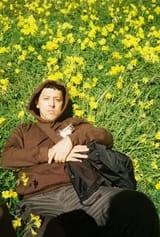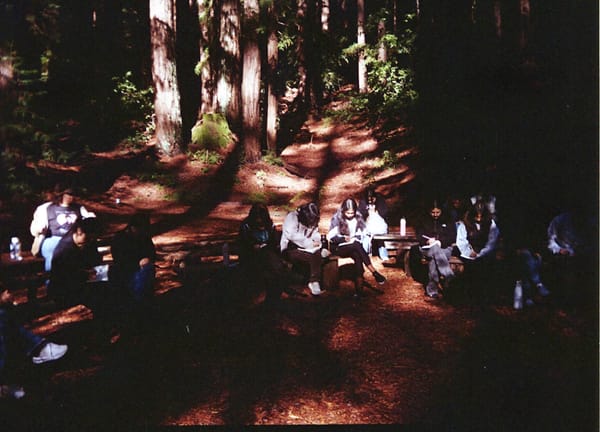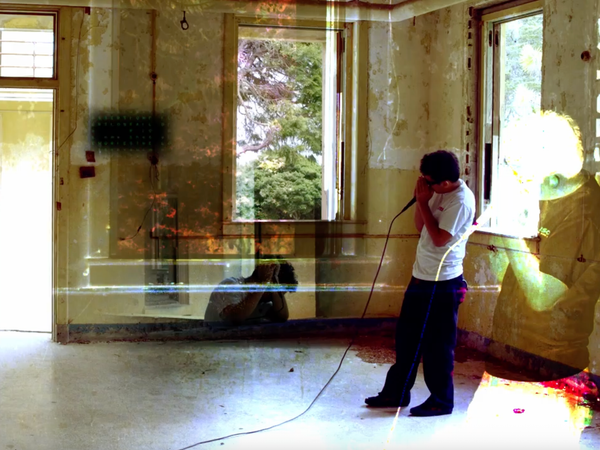Reflections on 2023
A recollection of the events in my life for the past year.
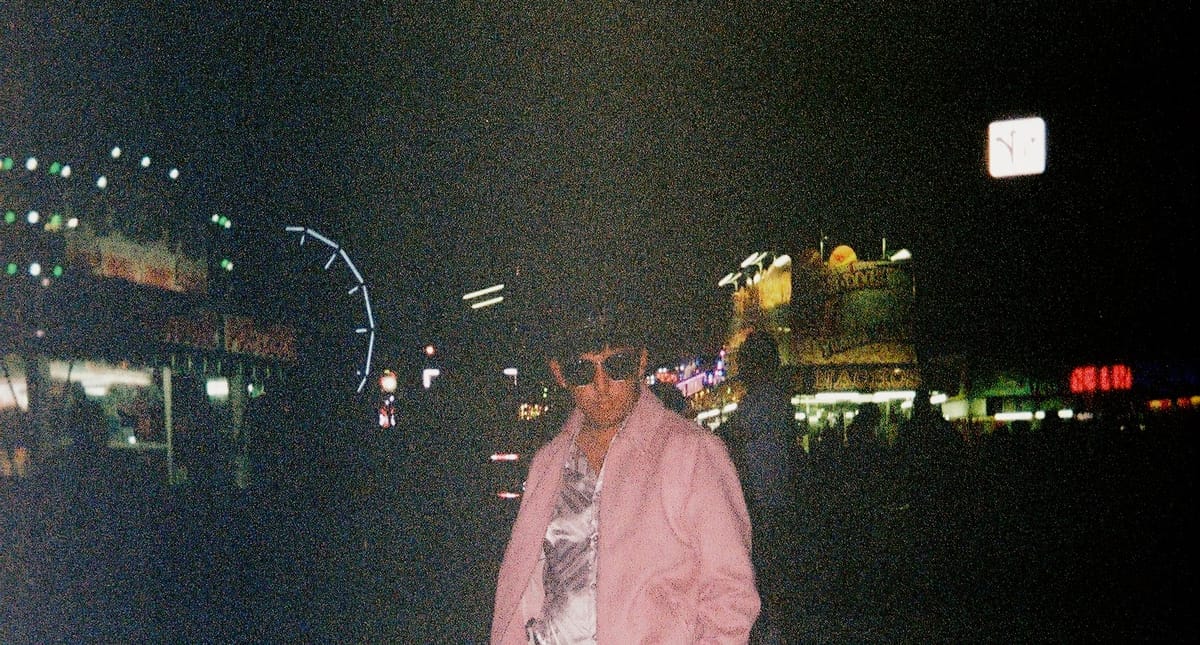
This year has been unique and eventful. We were ushered into a new era with the release of ChatGPT around the end of 2022. Despite stock market rallies, economic conditions have hardened, and many have been laid off. Social media and streaming have dominated popular culture and discourse. To finish the year, we're currently witnessing the genocide of a people live, with the well-documented deaths of over 5,500 children since Dec. 20th—double more injured and counting. That's the equivalent of almost 10 Californian elementary schools, gone. I've been thinking a lot about the current moment and how in some ways it's different than any time in human history, but how we're also just reflections of the past.
Much has been written about the events of the past year. From my vantage point in Berkeley, CA, it seems that we are being thrust into a new technological future. Electric and autonomous vehicles have seemingly popped into existence. We quite literally have flying cars now. Large Language Models (LLMs) have made their way into the mainstream and are enacting the dreams of many of the first computer scientists—who envisioned a world with talking computers indistinguishable from human. To me it seems that we're rapidly headed to a world that is catching up to science fiction, in more ways than one.
To be clear, this form of society is nascent and has not reached all parts of the world. Only a select group of people have access to self-driving cars—most in San Francisco. (There was a botched rollout that left a bad taste in many's mouth.) Access to LLMs still varies over class and knowledge. (Just anybody can have the alright version of ChatGPT; only few can have the cutting edge version.) Just like all technological invention, there is a gap in access and effects—remember how Facebook used to be only for the elite colleges?
All this is the context in which I situate my year. I am fortunate to be included in the tech scene; to see these innovations on the so-imagined front lines and mostly safe from the hurting in the world right now. I could spend the remainder of my reflection on the world and what our duty to each other is in the face of all of this, but I strongly believe that we must take the time to celebrate our victories and work.
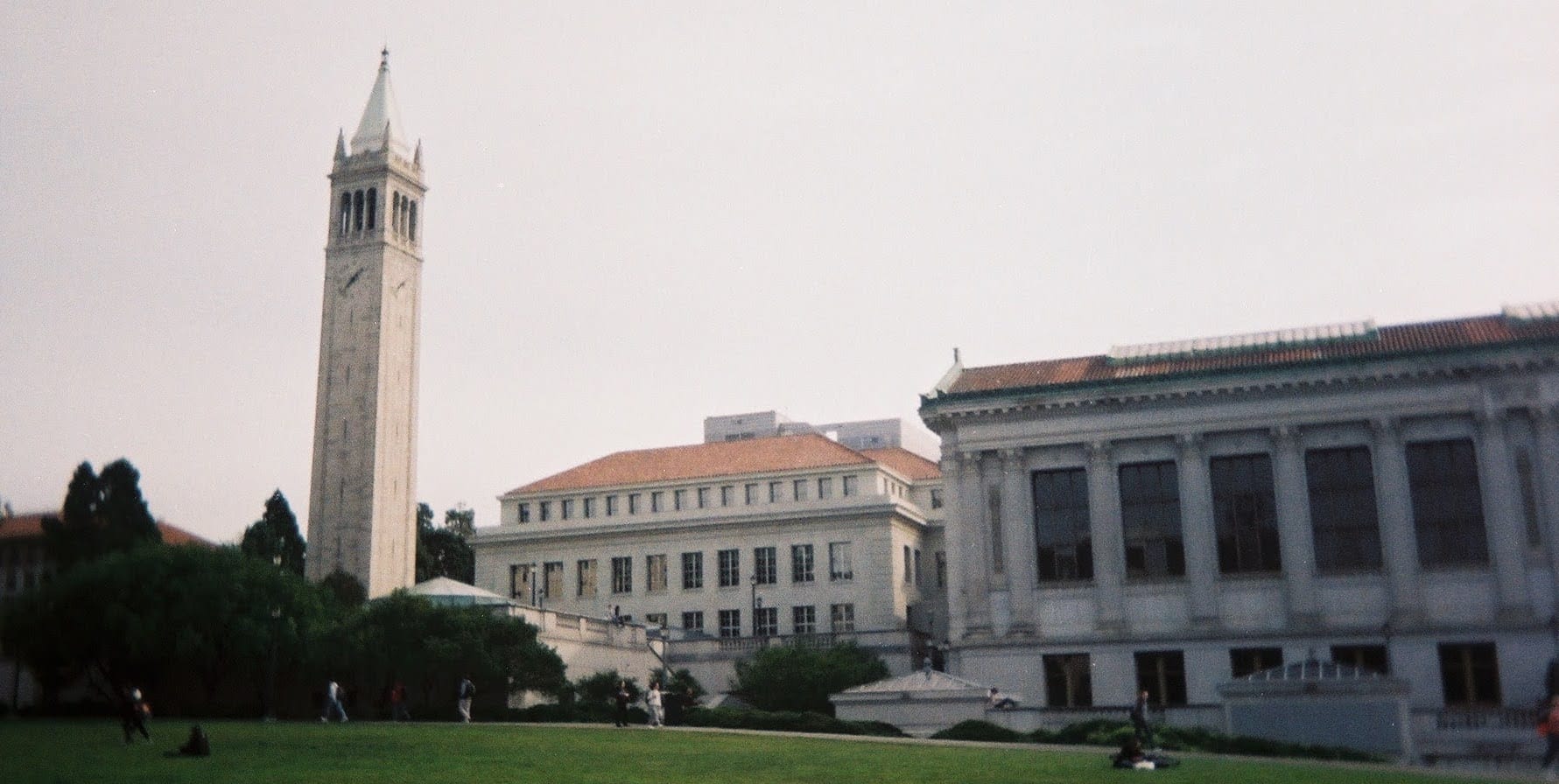
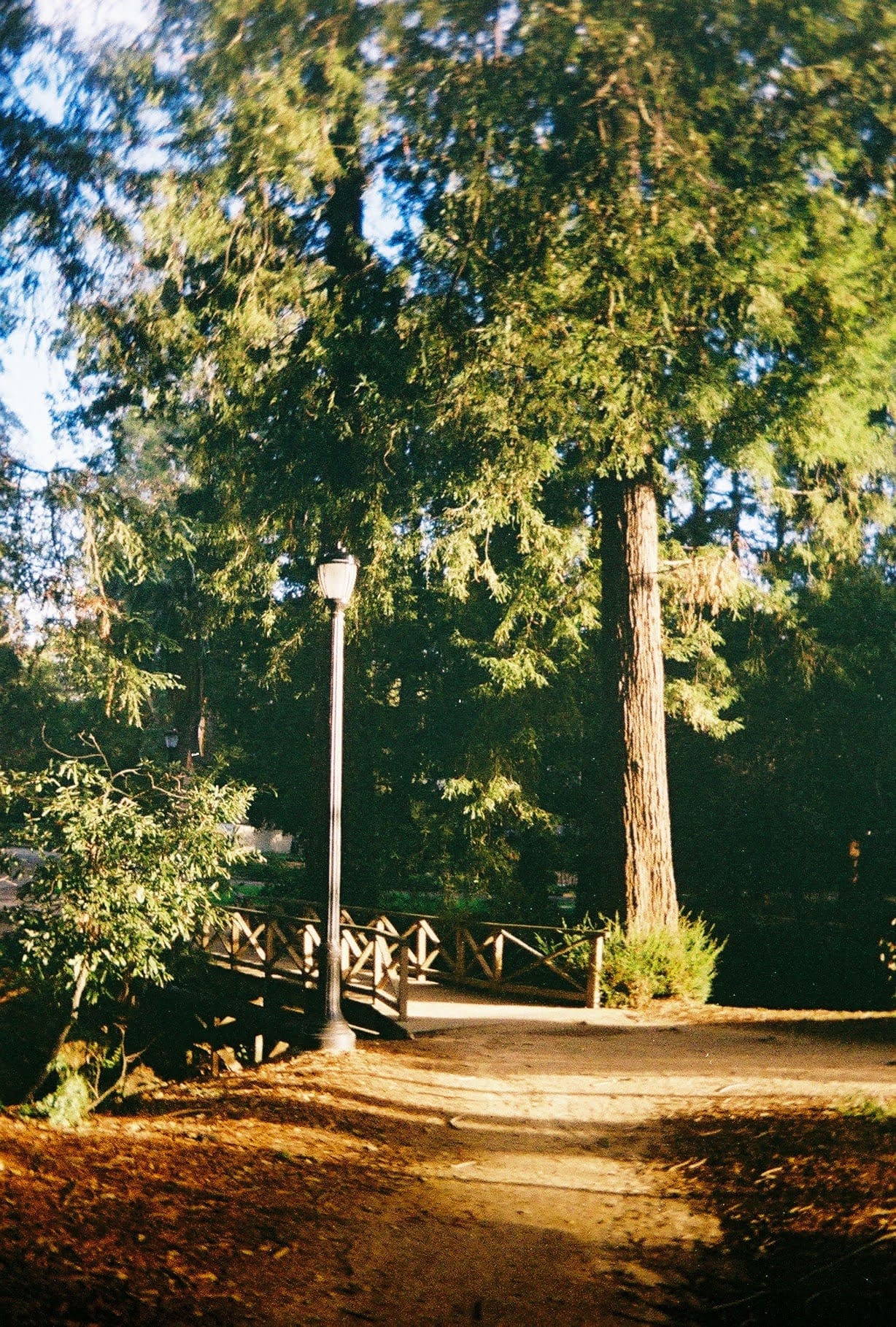
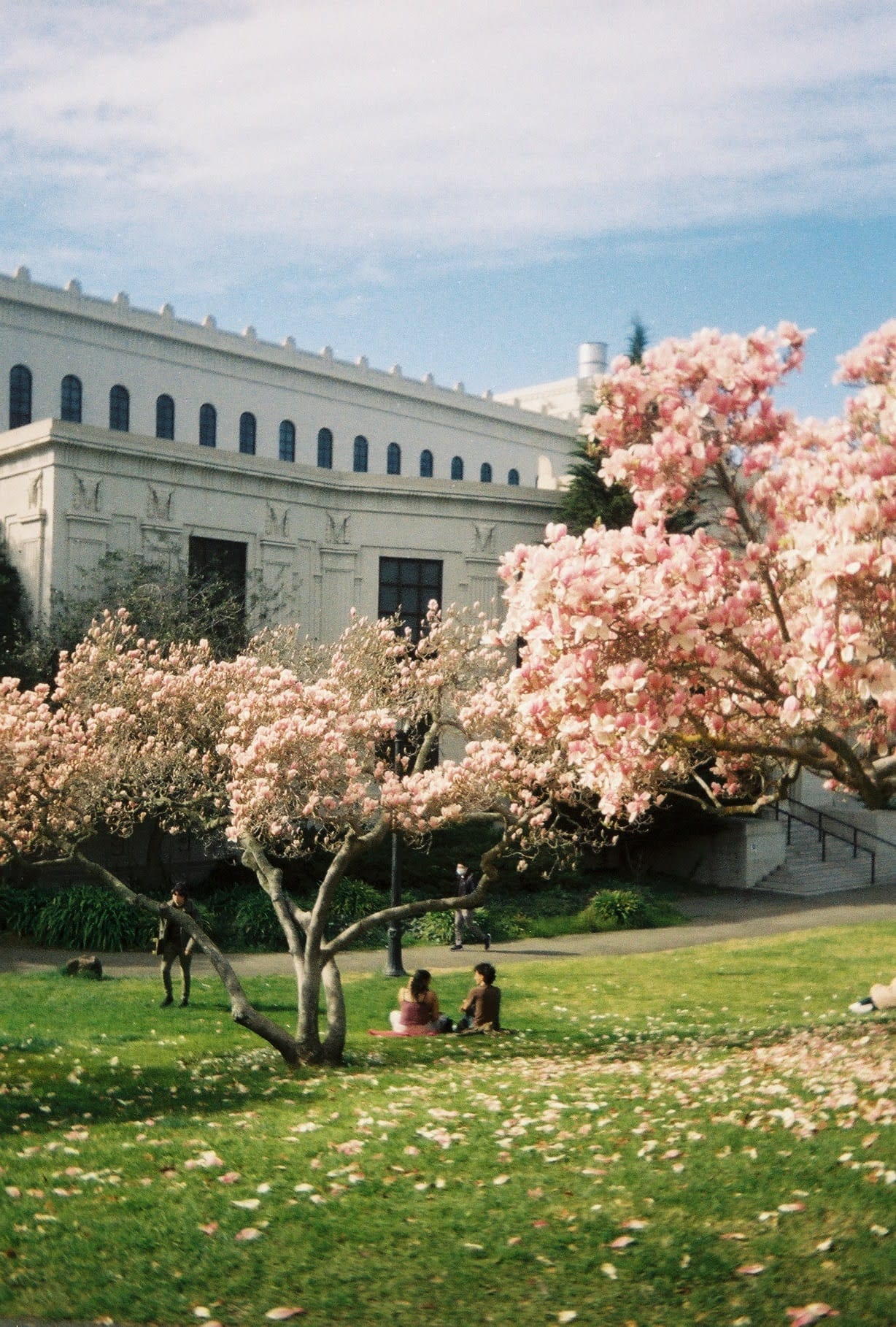
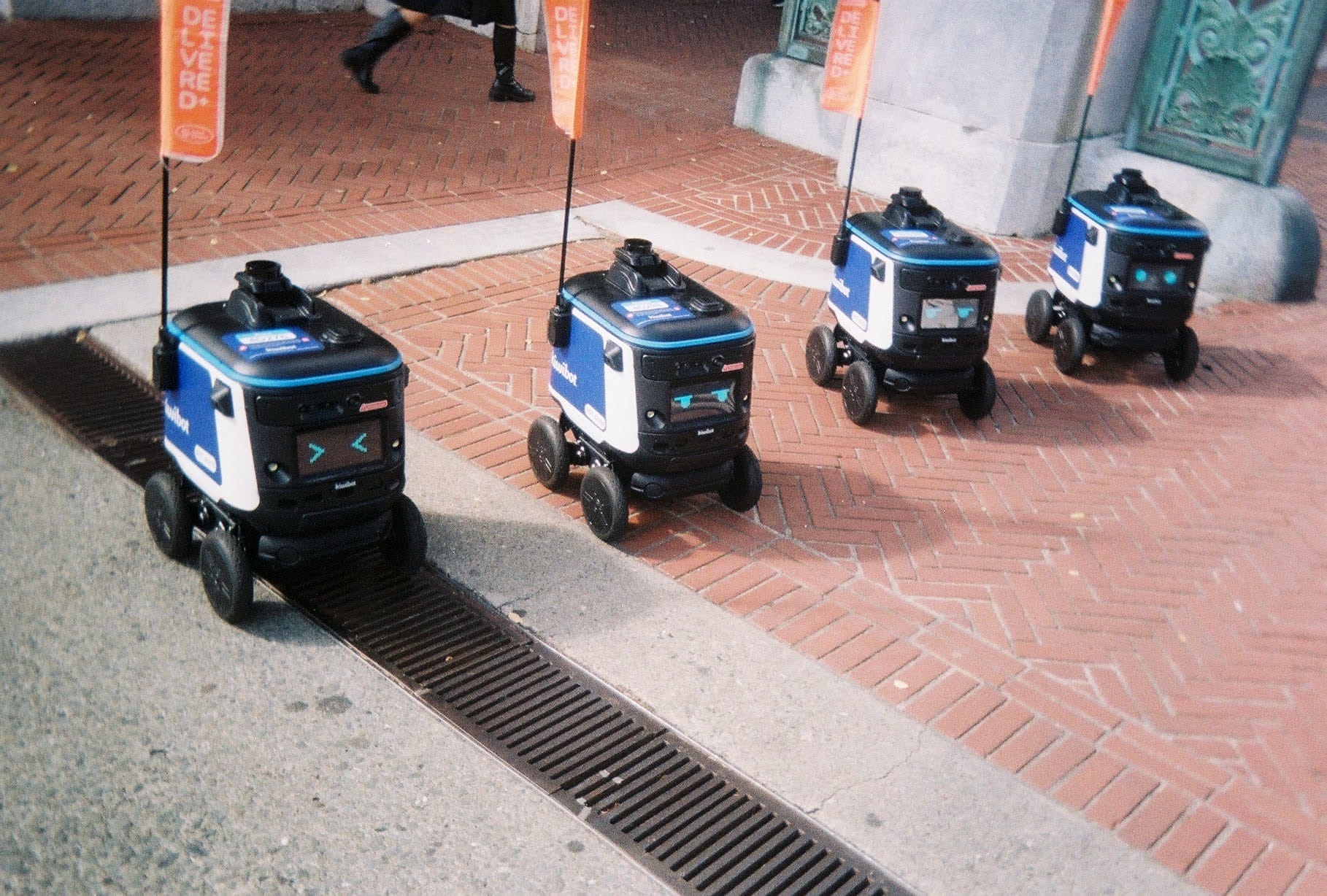
Film from UC Berkeley in spring 2023
The beginning of my year was spent diving into research and researching. I took a class on social science research methodologies with Professor Carolyn Chen. I learned a lot about how to conduct research, and in a way that centers the community rather than extracts from the community. This type of research is not the norm in academia: community-centered social science research is situated in contrast to a long history of exploitation and harm to the subjects. I shouldn't need to convince you of this, you need only look towards UC Berkeley illegally holding remains of Native peoples for decades. In fact, professors taught with the remains, despite Native communities' protests.
This class was notable to me for two reasons: I learned how to conduct research properly and I read Professor Chen's book, Work Pray Code. Aside from using the book as an example of ethnography and interview-based research, Professor Chen also presented an important thesis. Work Pray Code centered around the idea that in the Silicon Valley tech industry, work has been and is replacing religion by becoming the caretakers of their employees.
"[One tech worker] articulates this clearly: When the company takes care of the whole person, it gets the whole person. [...] As [another] claims, the meaning of work changes when employees invest their whole selves in the workplace. Work is not merely the contractual exchange of labor for wages— but, as I showed in chapter 1, it becomes charged with emotional, social, and spiritual meaning. Tech workers identify with work. They want to work. They need work."
— Work Pray Code by Carolyn Chen
Do I need work? Yes—as the remainder of my reflections will show. I will be the first to admit that the companies I've worked at have treated me well, and I've given back in return. What this book changed for me though, was the understanding that for some people (myself included), work is life. It's not something I understood a year ago, due to my upbringing. Whenever I talked to my family and friends, work rarely entered the conversation—it was always something you just had to do. Yet, work can be a strong and beneficial force in people's lives if you have the privilege to be able to choose what you do.
If there is one thing I am proud of this year, it is the work I have been able to do. Throughout the spring semester, I conducted some research for Professor Chen's class and I felt proud to produce some new knowledge. What resulted is this paper that I posted on LinkedIn. The title is "The Impact of Digital Social Media on the Mental and Social Health of Latinx Young Adults," so you can probably imagine what I talked about. If there's one takeaway from the paper; it's that social media has both beneficial and adverse effects on people. I probably could've written another 10 pages, if it weren't for the constraint of finals deadlines. I also took a class with Professor Pablo Gonzalez titled Latinx Sound and Media. As the name suggests, we talked a lot about music, social media and how it relates to pan-ethnically Latinx folk.
It's hard for me to admit, but I previously had a really unhealthy relationship and addiction with social media. For the past two years, I've been on and off for various reasons, but I can say I have a better relationship with it now. You may feel some familiarity with this, and many people have shared with me their struggles with social media. These are the sources of my research interest in social media, especially as it pertains to mental health, identity and community. I'll revisit this later in my year.
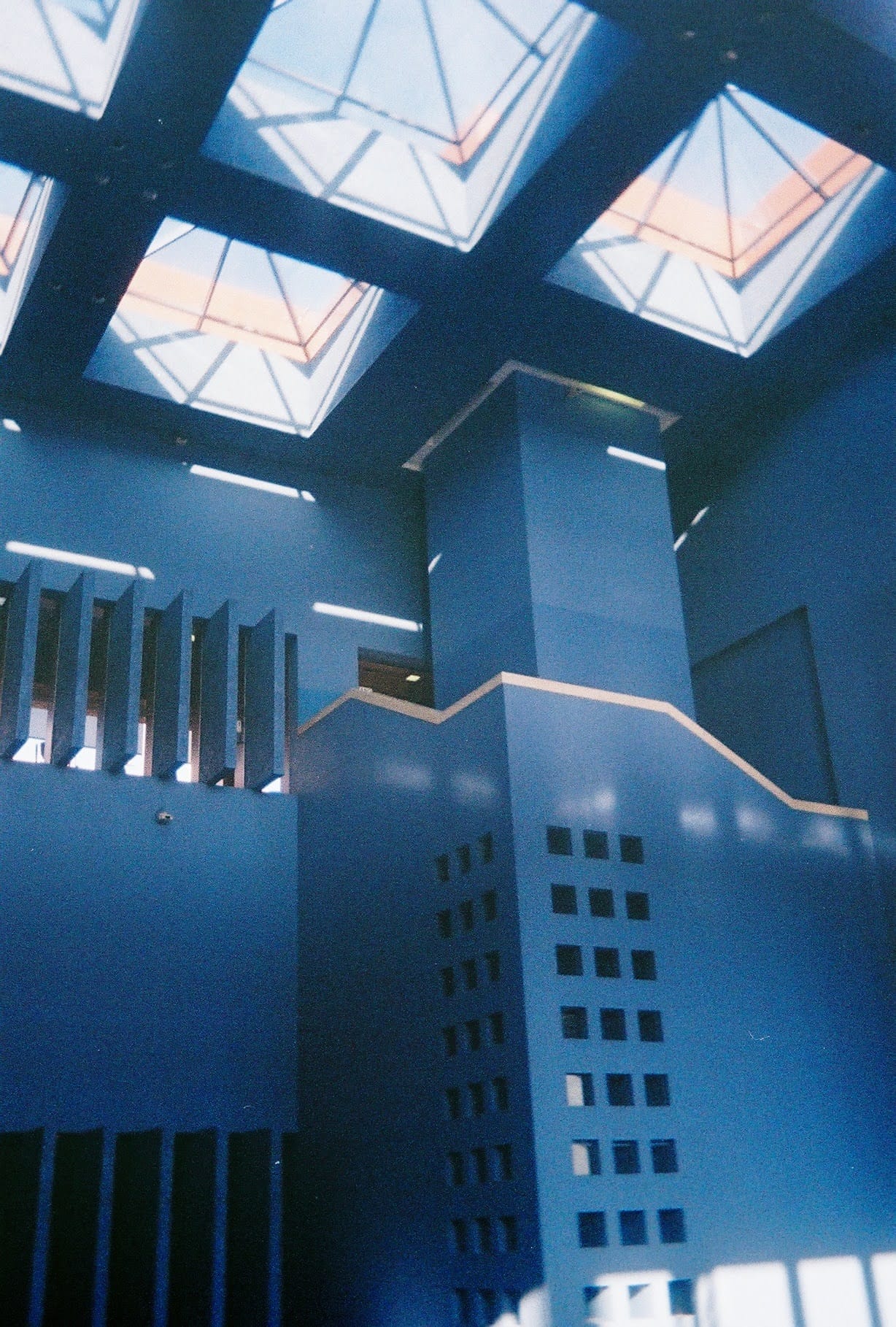
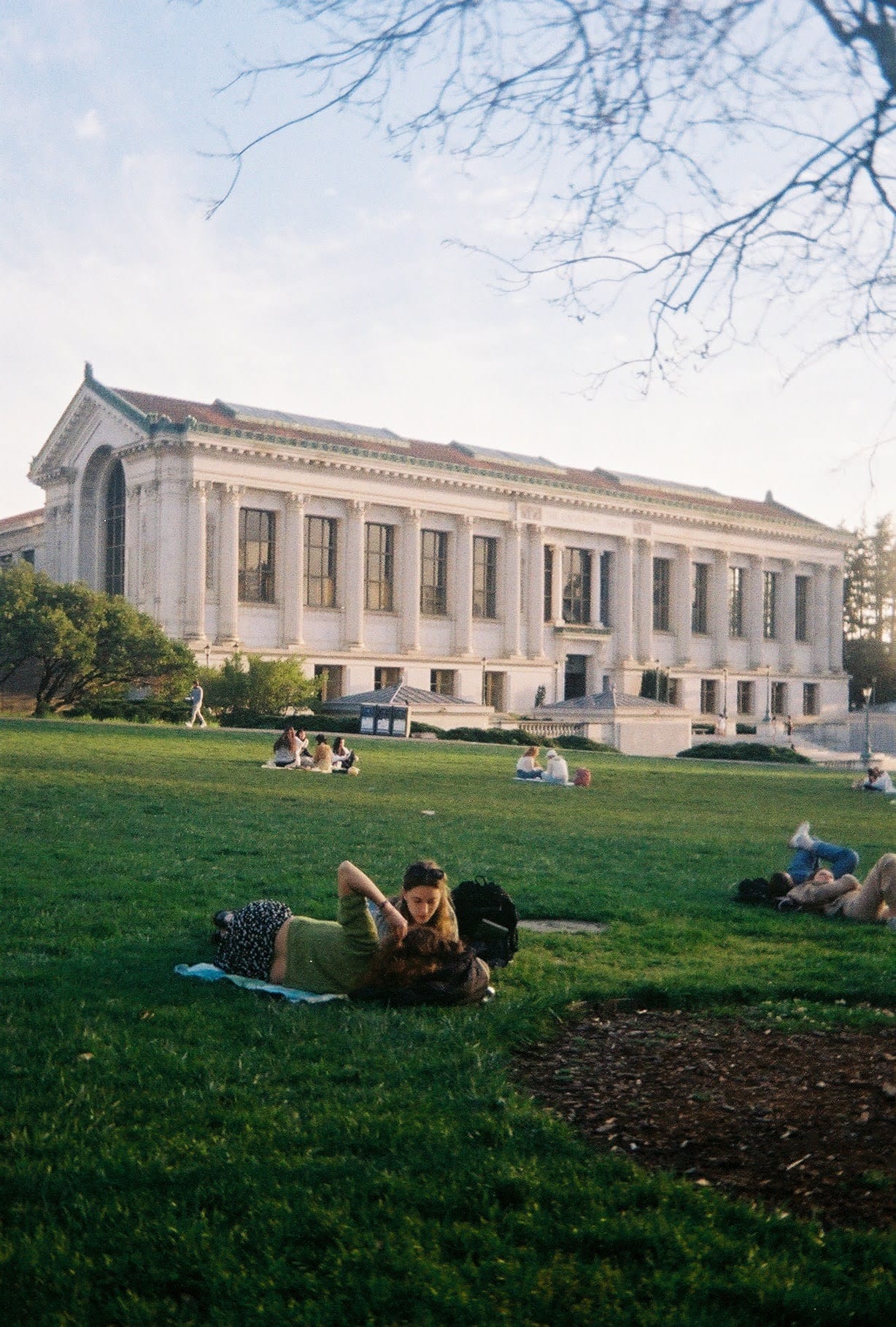
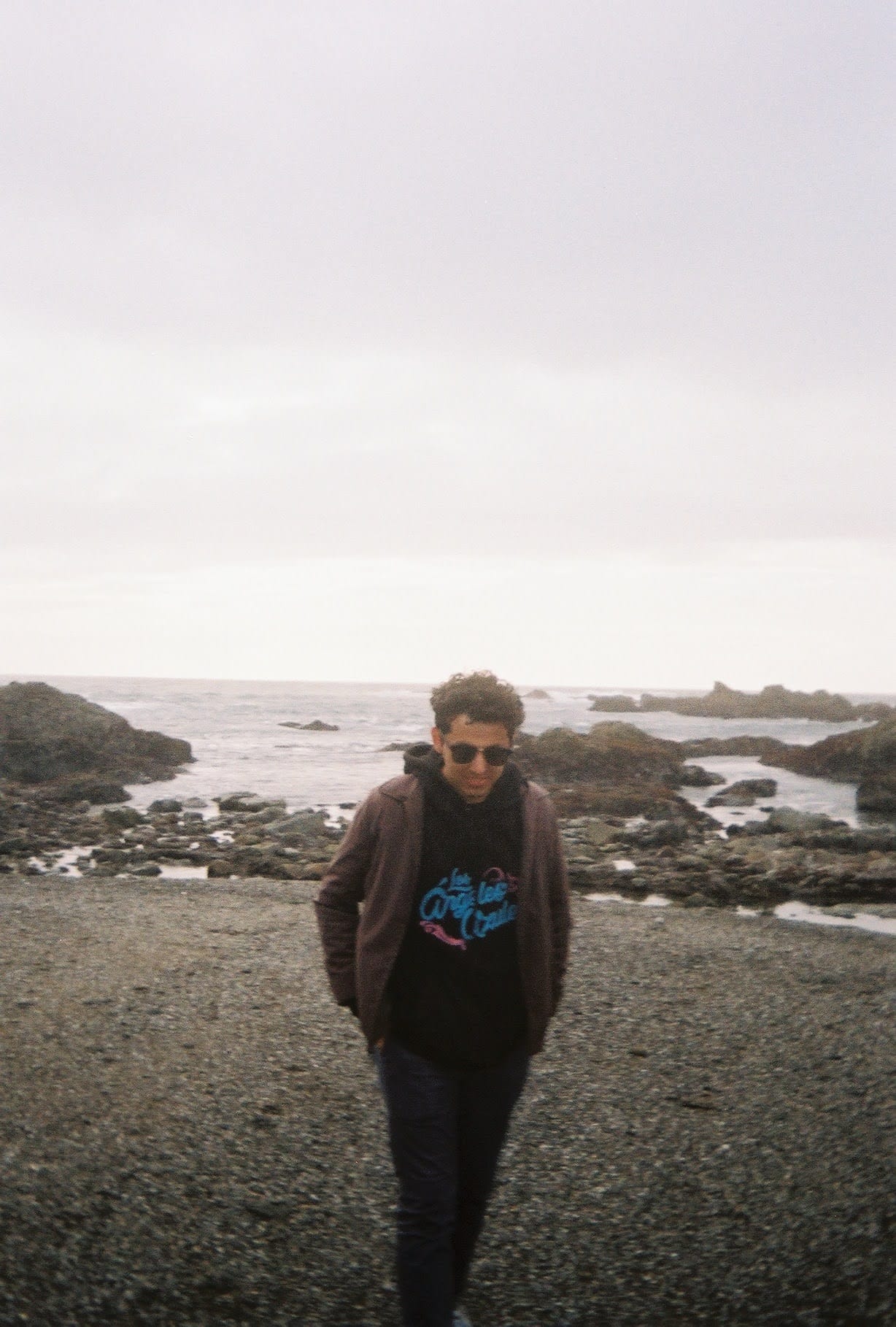
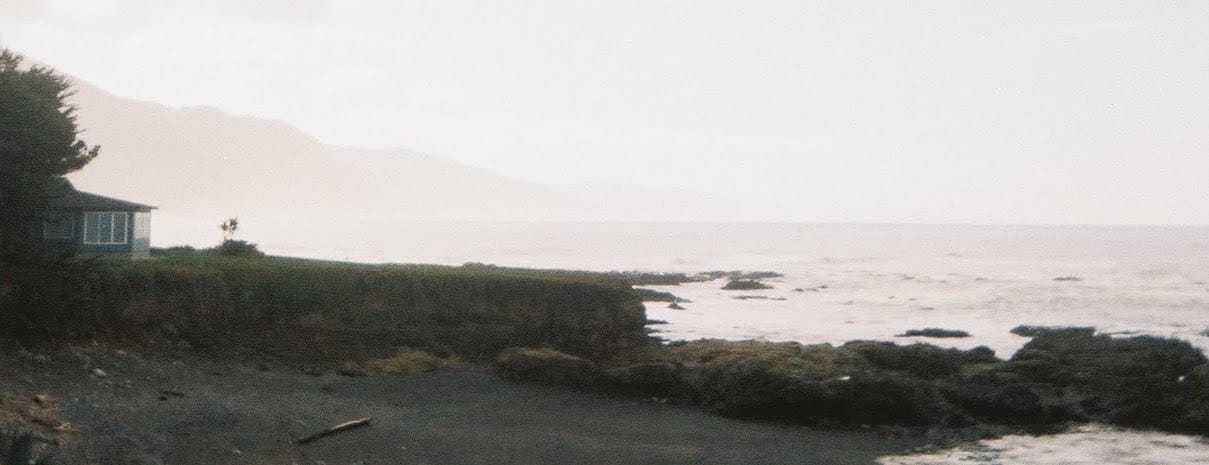

Film from my spring semester and break
In the 2022-2023 academic year, I served as the Director of Student Retention for the Hispanic Engineers and Scientists (HES) at Berkeley. What this meant was I helped provide Latinx students in STEM mentorship and resources. Both in the fall and spring semester, I set up a mentorship program that connected older students with younger students in their fields (we called it the Big & Little program). There wasn't too much turnout at the events I hosted for the mentorship program, but it turned out that some people really vibed with their mentors and felt supported by them.
The Hispanic Engineers and Scientists have a long history at UC Berkeley. We've been on campus since 1974. Next year, 2024, will mark our 50th year anniversary. Our history is one of a struggle for resources and representation in STEM fields, and the work is not over. For me, it's a little more personal. After I had gotten elected to be the Director of Student Retention, my mom shared with me that during her time at UC Berkeley she was also on the board of HES. (Funnily enough, she didn't study a STEM field.) I also found out later on that my uncle, the first in my family to go to college, was the President of HES at one point.
The photo I share next requires some context. It comes from a collection of albums that HES has maintained dating from the 70's onward. It is a photo of the annual banquet, in which board members of HES were presented awards. My mom, Nellie Rios-Parra, is on the second to right.
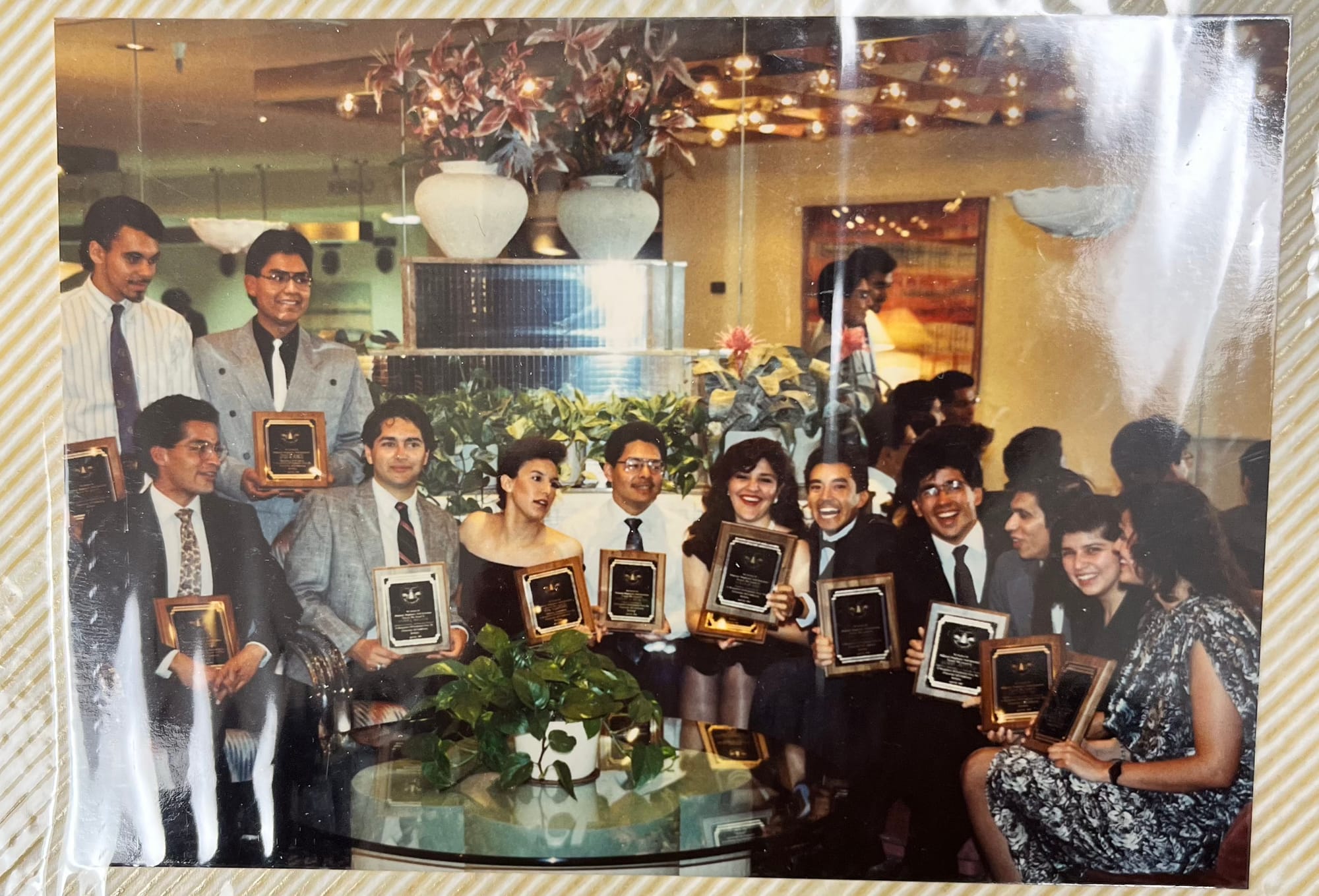
I have the honor and privilege of coming from a lineage of people who succeeded despite the odds. From people who were in the East LA walkouts in the late 60's. From people who worked to make sure others could have access to the same privileges. I stand on their shoulders; I am only here because they were there. It is with pride that I continue their work.
In the end of the semester, we held elections for the next board of HES. I was elected Co-President with Sebastián Quiroz, along with a set of amazing, wonderful people. We are currently in the midst of our work for our community, which resumed in the fall.
If my classes and HES weren't enough, I lent my energy and time to other spaces on campus in the first third of this year. One of my friends had posted about the Anthropology Library and UC Berkeley's plans to close it. They asked for people to show up to the space to begin the work to keep it open. I—knowing the history of anthropology and it's connection to my own studies (for better or for worse)— decided to come out and support in any ways I could. I believe the movement towards austerity by UC Berkeley is not in the best interests of us, their students. Our efforts were to occupy and use the space: sleeping at the library, attending teach-ins about the library, and speaking to authorities about the library. An interesting tidbit is that I got mentioned in The New York Times:
Alexander Parra, who is majoring in computer science and Chicano studies and who has been occupying the library, said that one of the things that would be lost if the library closed was the possibility of serendipity — of finding a book you didn’t know you were looking for. When students staged an occupation earlier this year, after the university announced the closure plans in February, Mr. Parra by chance noticed a title about Mexican American youth organizations, a subject he was researching.
“That’s me,” he said. “That’s me in that book.”
— "In Berkeley, a Library Protest Is a Fight for Anthropology in an A.I. Age" by Tim Arango
This work last many months, and I came in and out of the space as my schedule's demands of me fluctuated. I feel it important to acknowledge the incredibly smart and dedicated students in the anthro department who stayed throughout it all, and left an impact for the better. The space always felt incredibly inclusive, and really created community in a time where it seemed that the University wanted to let some of that go.
The spring semester came and went, and I felt great about my progress in my studies and personal life. Yet, I knew that the majority of my work was only getting started. I had planned for a lot before I could finish the year. The most immediate things going into the summer were my internship with Stripe and helping run this year's iteration of CodeDay Labs.
I started my second internship with Stripe during my finals week at Berkeley. Although it was definitely rough for that week, it was the only way to have a 16-week internship instead of 12 (and the Lord knows the extra paychecks helped out a bunch). I worked on the Buy Now Pay Later team for the second time, although it was comprised of brand new people, bar a couple.
Throughout my summer, I got to learn from and build with some amazing people. Through no fault of their own, my previous team at Stripe had pretty much dissolved during my first internship. This time around, the team was very stable and it lead to my success and growth. I picked up more tasks than I was slated for, and I thoroughly enjoyed getting into the weeds with some of my old and some new code. In my second to last week at Stripe, we had a team onsite in New York City. It was an incredible experience—I had great food all week and got to see some cool sights. I stayed and worked in the financial district, and got to meet the few team members in the NYC office and our team's European counterparts.


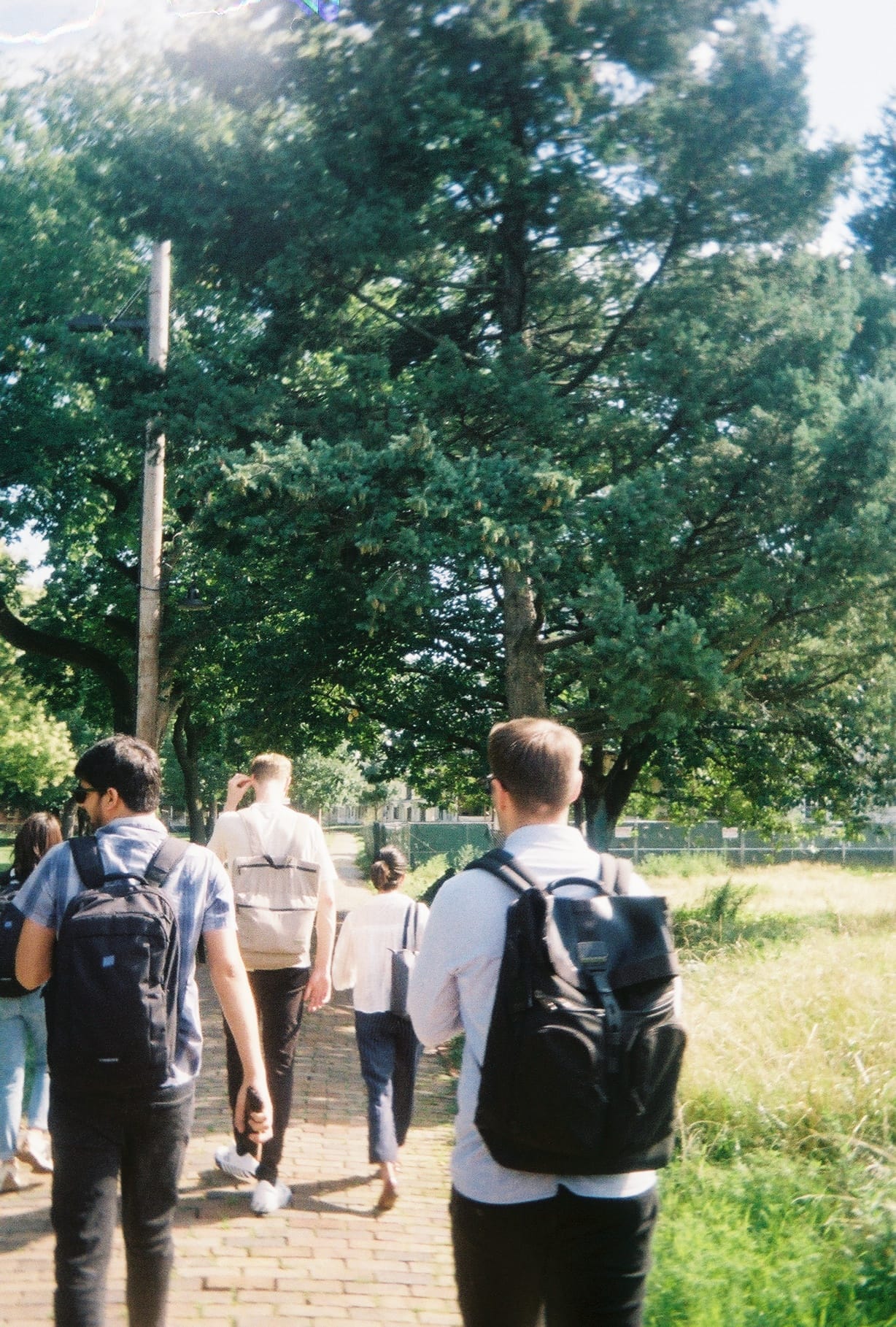
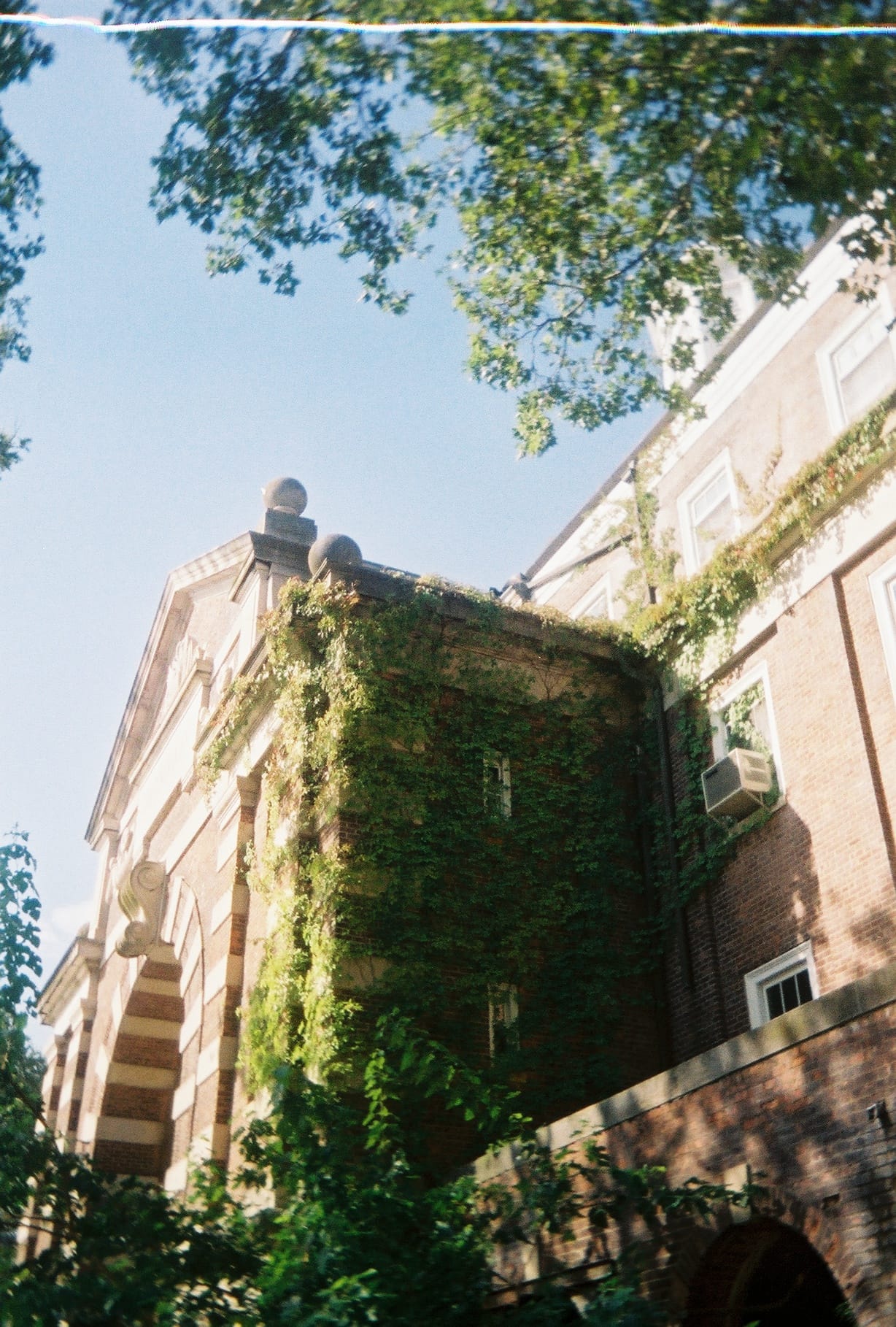
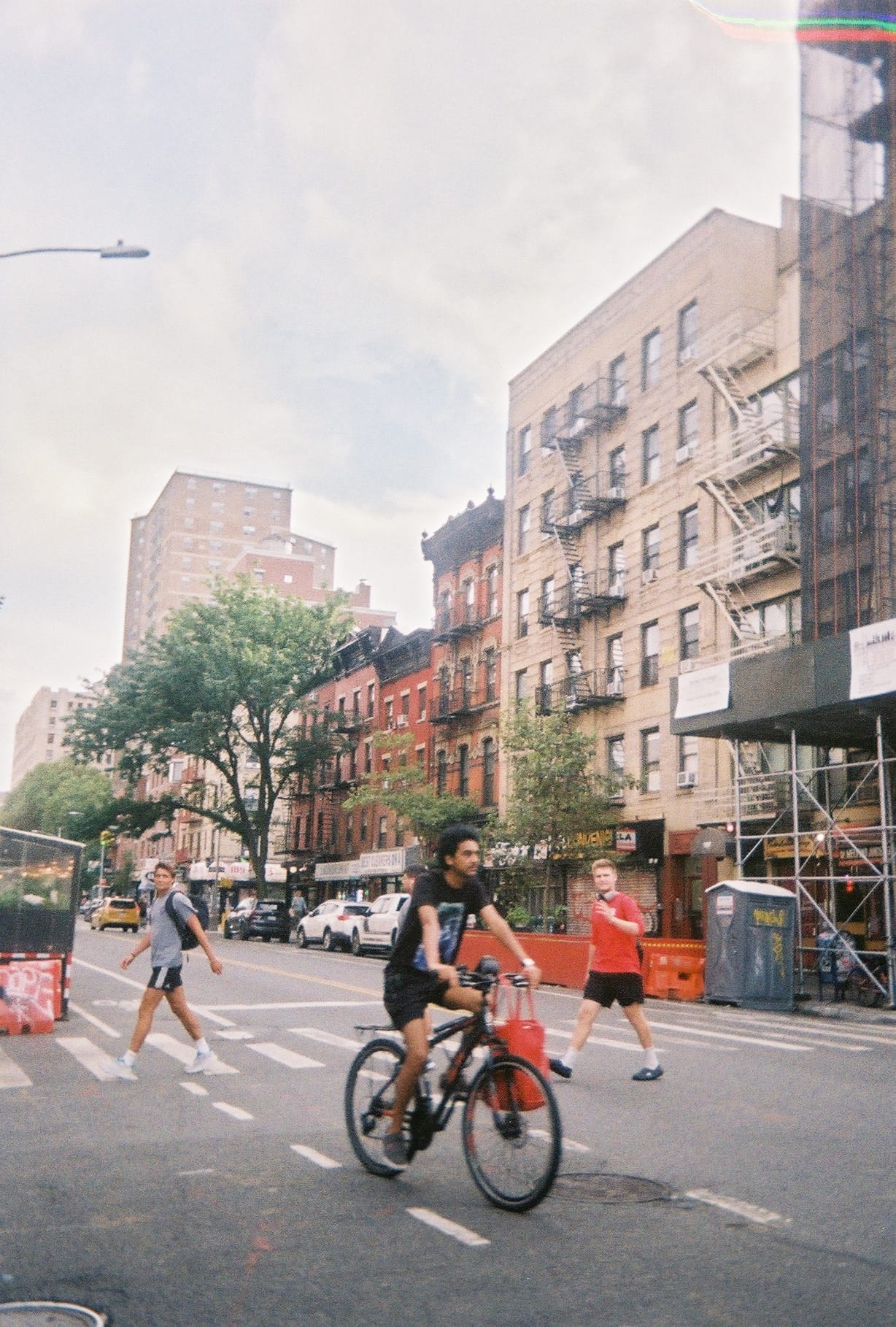
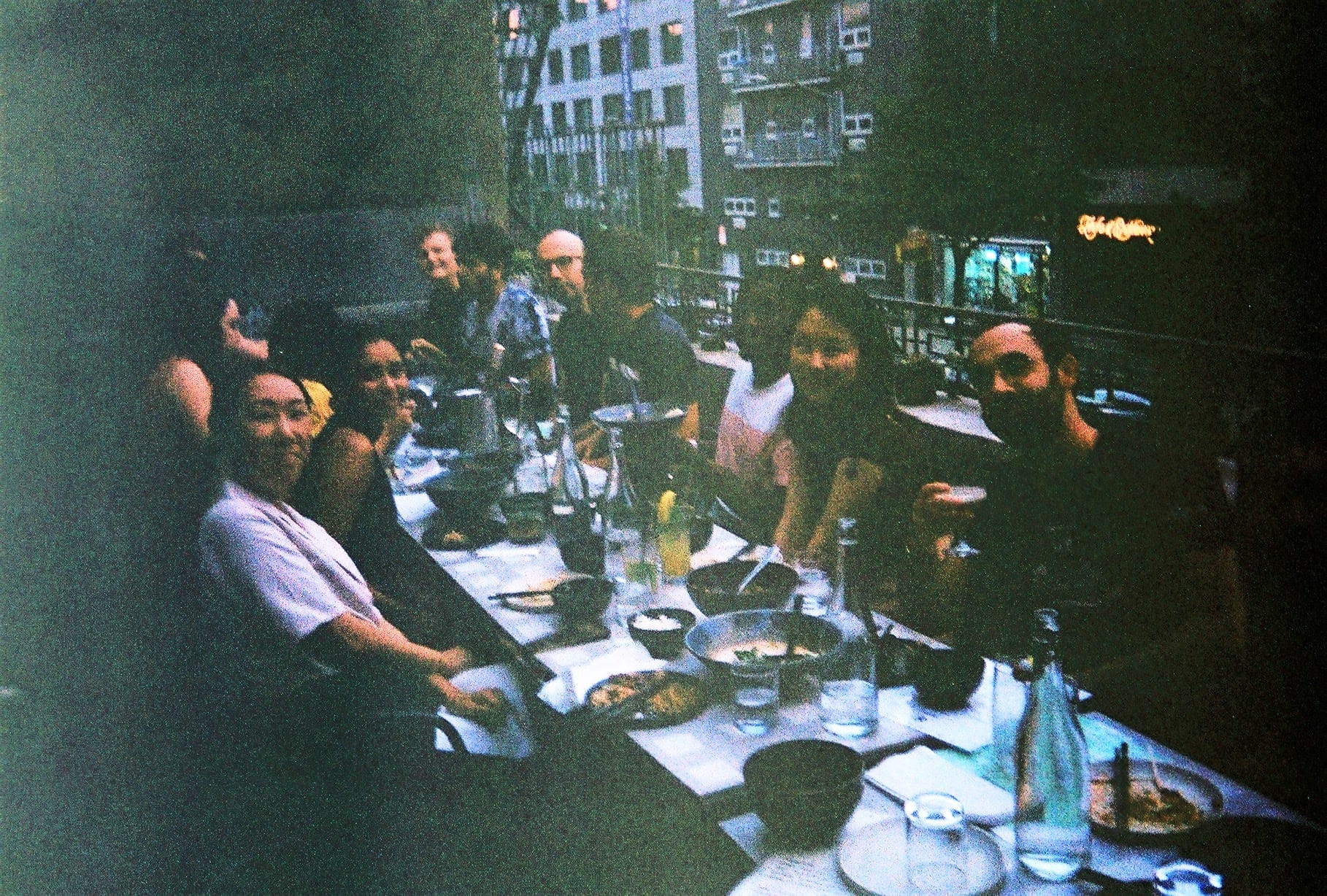
Film from my week in NYC
Coming into the internship, I knew that I was looking for a full-time offer for the next year when I graduate. I think this year, there was generally an increased anxiety over securing a full-time position. It was evident in the way I thought about work, and in the conversations I had with folks. It wasn't just at Stripe either—across the board people have been stressed and concerned about jobs. It makes sense in the context of incessant tech layoffs at every stage of companies.
Throughout the summer, I learned the most I could from my team. I was blessed to be able to be guided by some truly great software engineers and product people. At the end, I was given an offer to return full-time to Stripe as a software engineer.
In addition to my work with Stripe, I was also helping run the CodeDay Labs program alongside Tyler Menezes and Lola Egherman. In case you haven't heard of us, CodeDay is a global non-profit that aims to provide pathways into computer science and tech for the underserved. I got started with CodeDay many, many years ago at the hackathons that we host. Now, my work mainly is in the summer virtual internship experience we host for students, which we call Labs.
Much has been written about the program, including two publications under my name: "Closing The Gap Between Classrooms and Industry With Open-Source Internships" and "Open-Source Internships With Industry Mentors." There's also some research being done by Emilia Gan at the University of Washington about our program.
Basically, we've observed that the effects of the program are what we hoped: students who come through our program are getting jobs at higher rates than averages. This is at a statistical level; but at a more personal level, the stories have been great. I've had students tell me they were ending the program early because they were offered work through the open source project were contributing to. Some asked for letters of recommendations for their college applications (which I would like to think worked). Others regularly kept me updated on their careers as they got jobs. I cannot understate how much this motivates me.
I've done very well for myself, especially this year. Yet, that isn't really what sticks with me. What sticks is the little moments when people who I've taught or helped tell me that they no longer need my support. The CodeDay Labs program is one of those spaces that I can give a lot of myself to and see the results. We're all engaged in these sorts of teacher-student/mentor-mentee relationships, and it is beautiful to see those relationships become more peer-like. When I look back on my year, it is these relationships that makes me realize that I've had a phenomenal year.
It doesn't hurt to be able to travel too. I was given the opportunity to head to Atlanta, Georgia for a National Science Foundation conference on Workforce & Education in computing. The goal of the conference was to showcase and connect all these efforts that are growing computer science as a field of study. It also happened to be colocated with the RESPECT conference, which is "the premier venue for research on equity, inclusion and justice in computing and computing education." It seemed like everyone there was aware of and dedicated to changing the facts of the disparities and inequities in computer science and tech. It was incredibly energizing to listen to the speakers, and to meet people doing great work across the country.
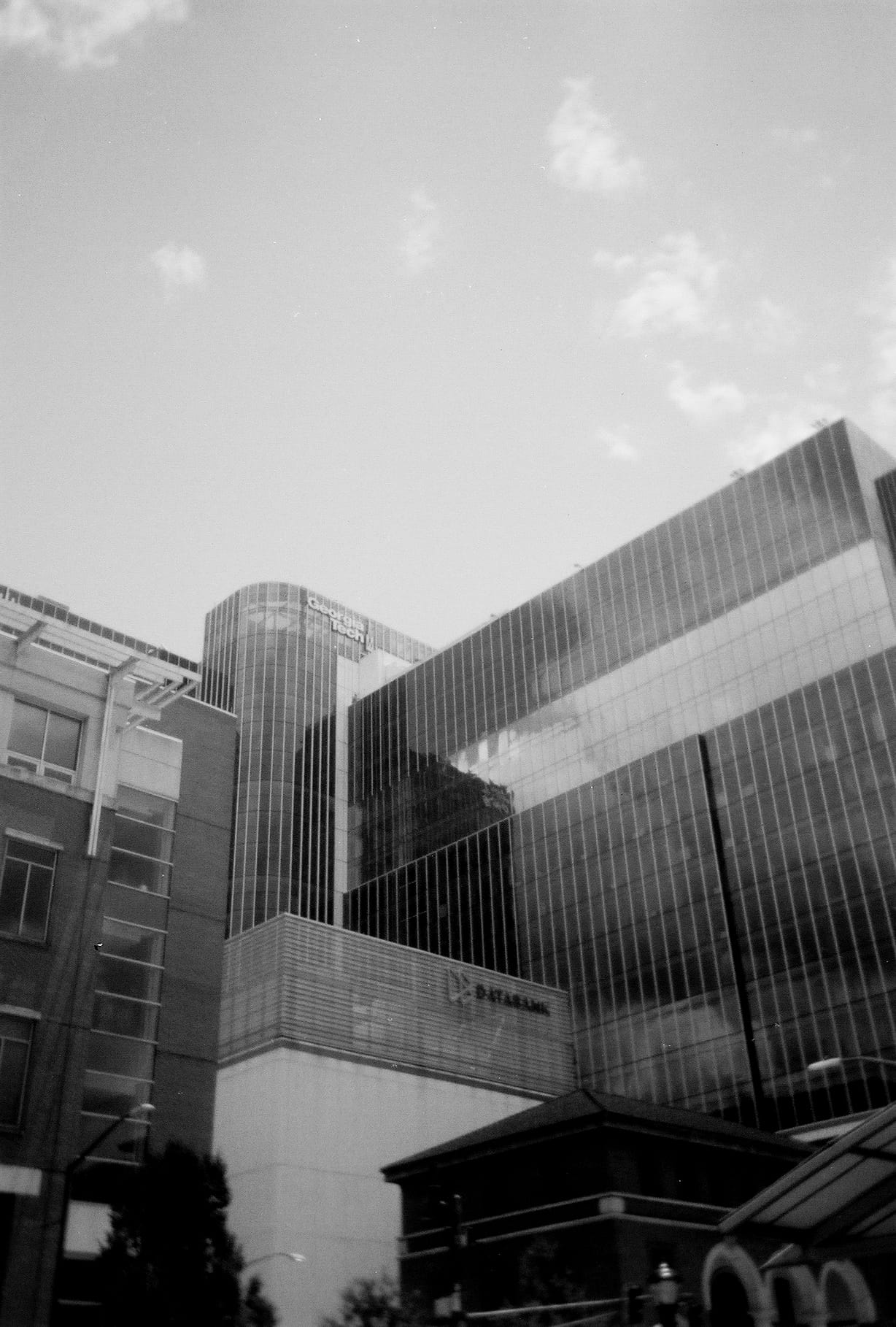

Black & white film from my trip to Atlanta
And that was my summer. A lot of work, a good amount of traveling, and immense reward. My journey heads to the fall semester, in which not only am I slated to take classes, but also to teach one for the first time. I have written before about the lack of diversity on course staff, and I had talked to Professor Lisa Yan about it at length. She had asked me to send out an announcement to HES members about applying for academic student employee positions, and I had decided to apply for CS 195: The Social Implications of Computer Technology. I was selected as one of the two Head TAs, along with Noemi Chulo.
In an unreleased article, I wrote at length about my feelings about Berkeley's inadequacies when it came to integrating social curricula in the Electrical Engineering & Computer Science (EECS) department. To me, the facts of inequities in tech and the harms of certain techs are symbolic of larger, more systemic and societal issues. In my view, the lack of diversity on course staff stems from the fact that the humanities are viewed as independent and exclusive from computing. CS 195 currently stands as the only 'ethics' requirement for EECS, and the only CS class that explicitly talks about social processes. It's a 1-unit pass/no pass class in a new college that named itself the College of Computing, Data Science and Society.
It's pretty evident that society is impacted by tech. And yet, we are still working on understanding that society also impacts the way tech is made. That's one of the theses of the class, as taught by Professor Yan. We did a lot of iterating on the class curriculum, and I left my mark on it. We discussed tech's harms to specific communities, and how we might be better engineers in the future. Indeed, the title of this newly minted blog, Dreams of a Future, is derived from this notion that we can engineer a better future, if only we have the ability to dream of it. The question became for me: how do I learn from and teach people the better engineering I know to be possible?
Answering that question is no easy feat. It truly takes a concerted effort among many people to get there. This year gave me faith that those people exist: from the conversations I had with students in my class to the academics at the RESPECT and NSF conferences.
Creating equity and justice in the industry can be one way of making the field better, and I engage in that work as much as I can. Just the fact of my existence and visibility has already changed things for the better. Yet, the culture needs to change towards critical self-reflection: what are we doing and how are we getting there? I find myself unsatisfied with the progress. Perhaps that lack of satisfaction is a good thing, but for now I must recognize that the work we did in CS 195 was a step in the right direction.
I was also honored to learn from bright students really interested in these questions. We held an Honors discussion section and it was a great pleasure to lead it. I got to learn from exchange students, graduate students and people coming from different fields. As Paulo Freire (who we discussed in class) would say, teachers learn just as much from their students as their students from them. I know that getting all these different perspectives meant that my experience was that much more rich.
In addition to my classes, I am now one of the Co-Presidents of HES. We can talk theoretically about making the field more equitable, but in practice I am part of a group of students who are actually doing it. We've had quite a bit of programming this semester. To kick off the academic year, we had a carne asada with an open invite. This time around we had over 150 people. Everyone who wanted to, ate. To date, there is no larger gathering of Latinx students in STEM at Berkeley (if you happen to find one, invite me!)
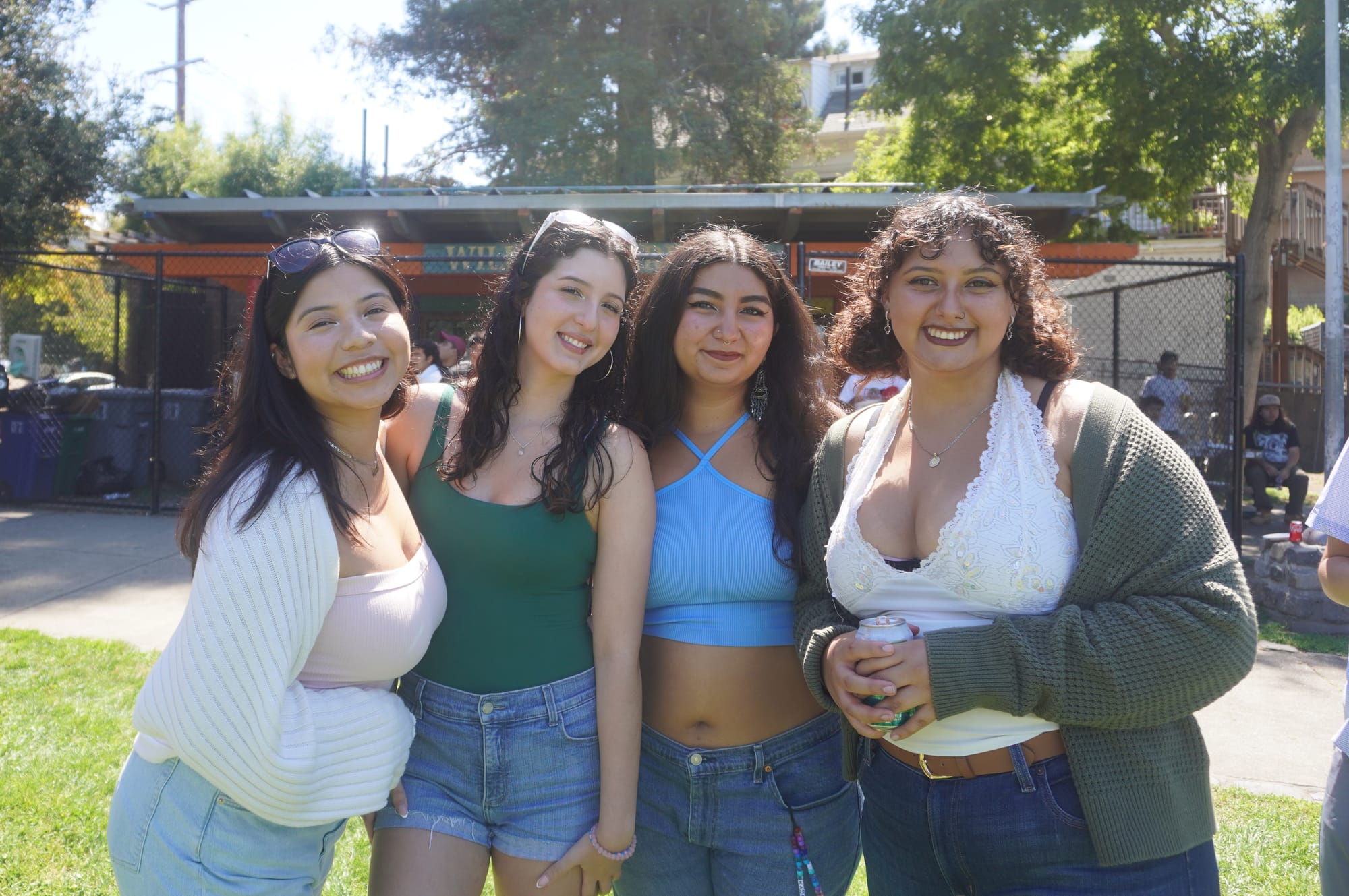
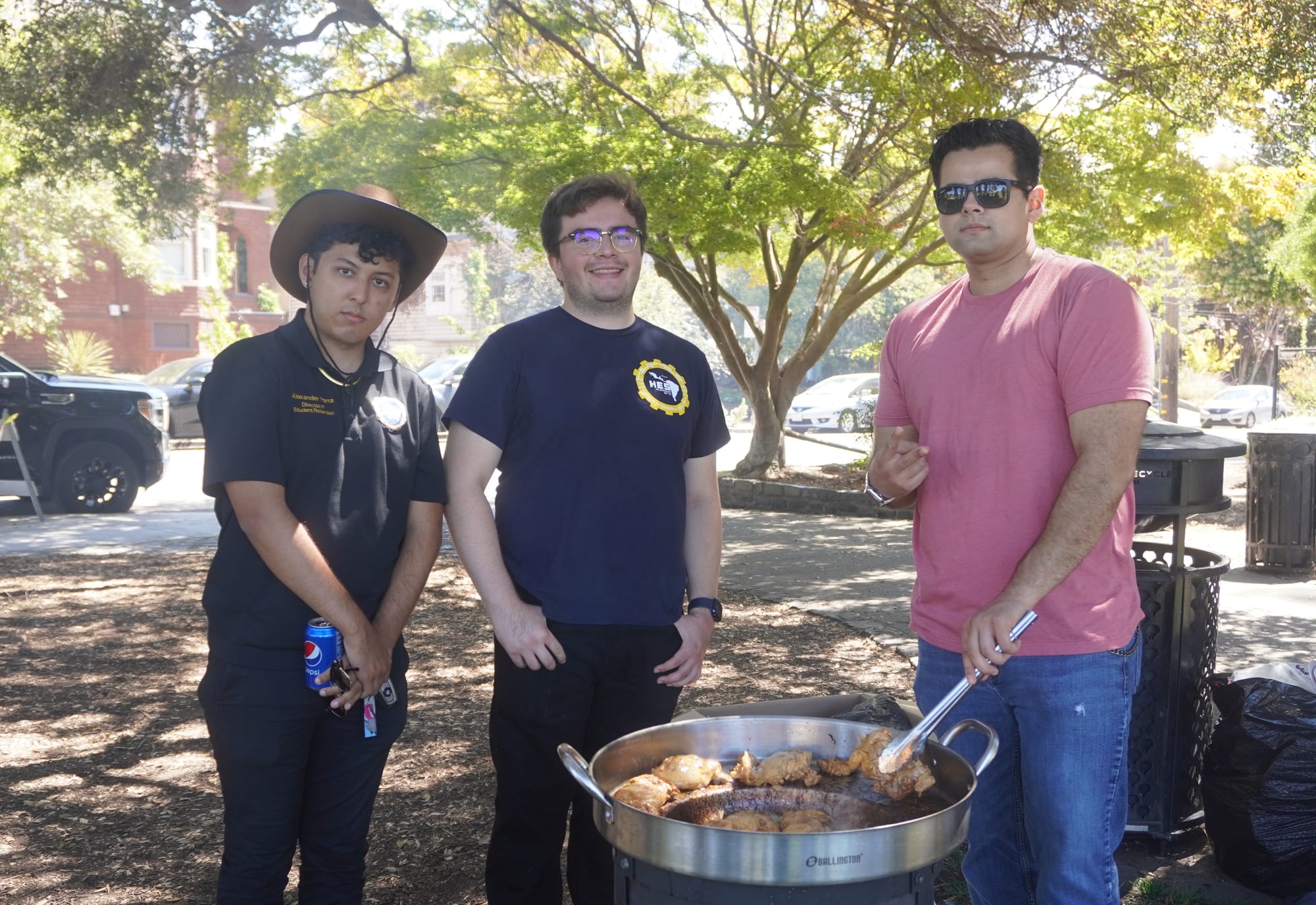
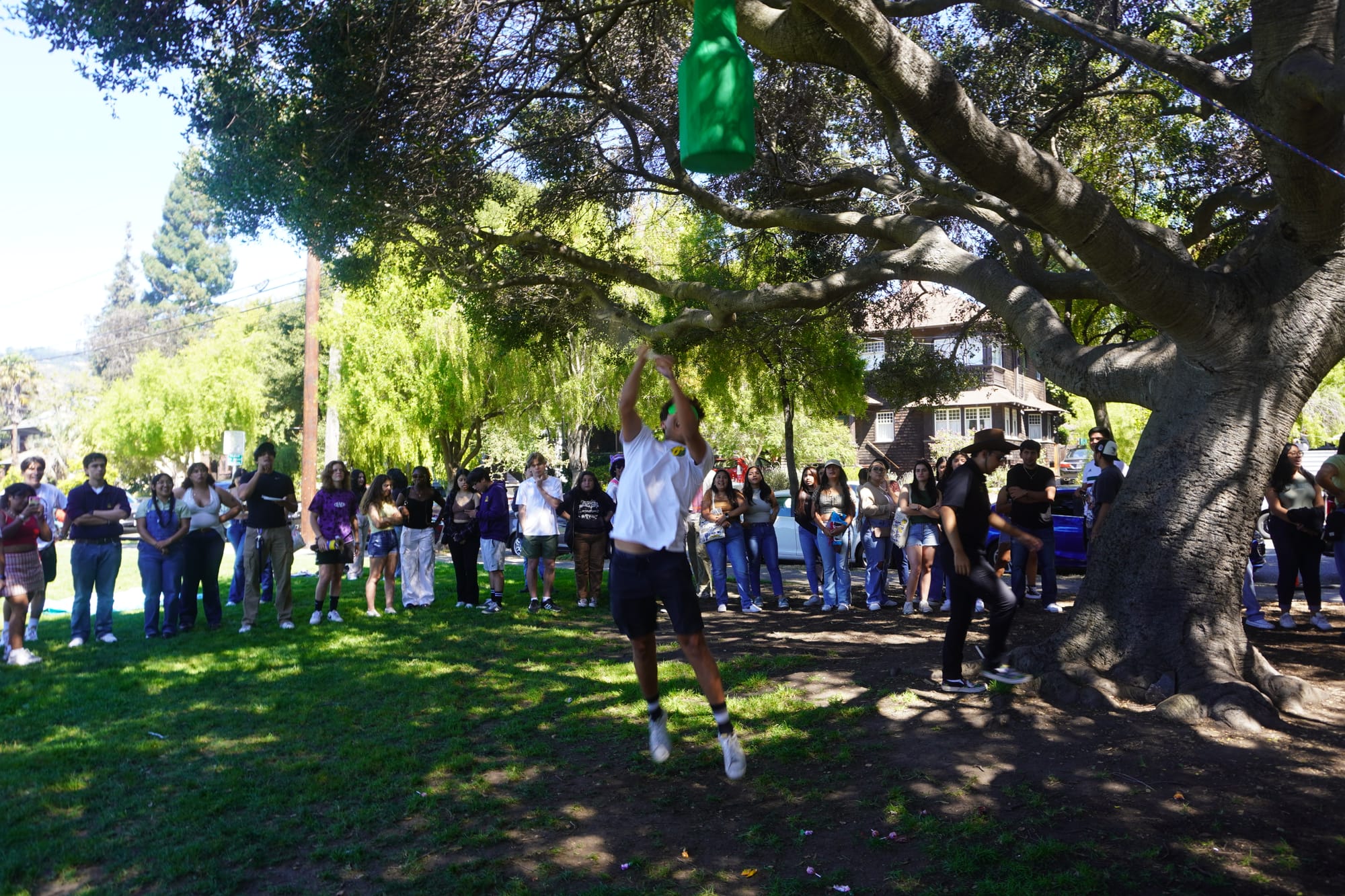
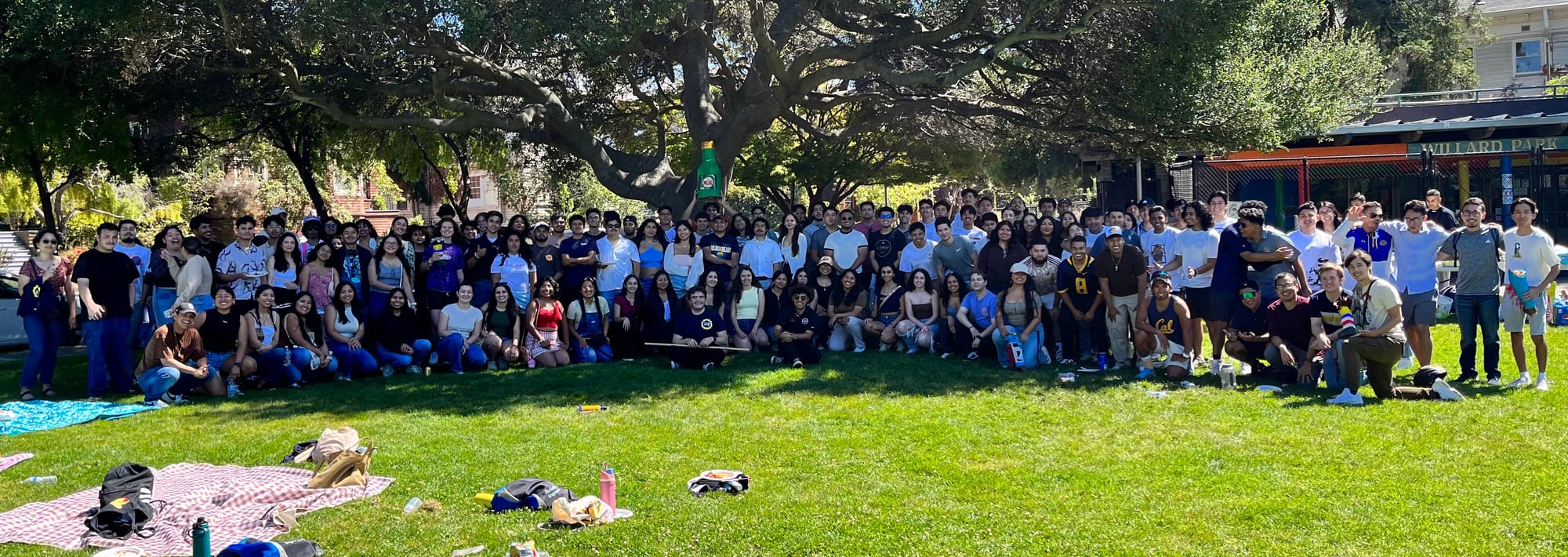
Carne asada hosted by HES
Sociologists have this term, 'effervescence,' which is used to describe an indescribable feeling that comes from community. I can theorize and philosophize on how to create equity in CS, or what we're lacking, but there is no way to understand what these photos mean to me. 'Effervescence' doesn't quite do it justice. I can tell you what I think being the 'diversity' and representation in TA roles means for me and for my community, but there is no way to get around the fact that the people in these photos are living embodiments of a better world.
Every year, we sponsor a number of students to attend the Society of Hispanic Professional Engineers (SHPE) national conference. This year, Sebastián and I had the goal of sending 50 students. It took not only him and I, but a whole group of people to make that dream a reality. We provided flights, lodging and conference tickets to just 1 shy of 50 people. We had people sponsored from other organizations on campus join us too, bringing the Berkeley contingent to over 50.
Special recognition for Marvin Lopez and Luis Castillo from Engineering Student Services; Audrey Sillers, the Director of Student Retention for the EECS department; and Anne Baranger, who is the current Associate Dean of DEI for the College of Chemistry. These are just a few of the people who helped make this a reality.
At the conference in Salt Lake City, we met Berkeley alum, connected with SHPE chapters from across the country, and grew together. A number of students got interviews with companies as a result of attending the conference, and a few even got job offers. Truthfully, there was much left to be desired from this year's conference: SHPE oversold tickets, didn't book hotels even though we paid for them, and the organization of the conference was largely dysfunctional. Regardless, we made the most of the experience and I heard from many that it was a trip they would not soon forget.
We've been able to do a lot of great work, from the Big & Little program to corporate sponsorships and socials. We're in the midst of this work, and I believe next semester is going to prove to be more busy. HES is turning 50 next year, and we want to make it a special year. It's celebration of 50 years of being at Berkeley despite the systemic barriers that have worked to keep Latinx folk out. Stay updated @hes_ucberkeley on Instagram, and if you're an alumni: we'd love to be in contact! Our website is linked here.
Throughout the semester, I was also traveling to attend conferences independently. Apart from Salt Lake City, I attended the Tapia conference on diversity in computing in Dallas via funding from the EECS department, and I spent a weekend in San Diego by invite of a cool program. Along the way I met some incredible people, learned a lot, and caught some cool sights.
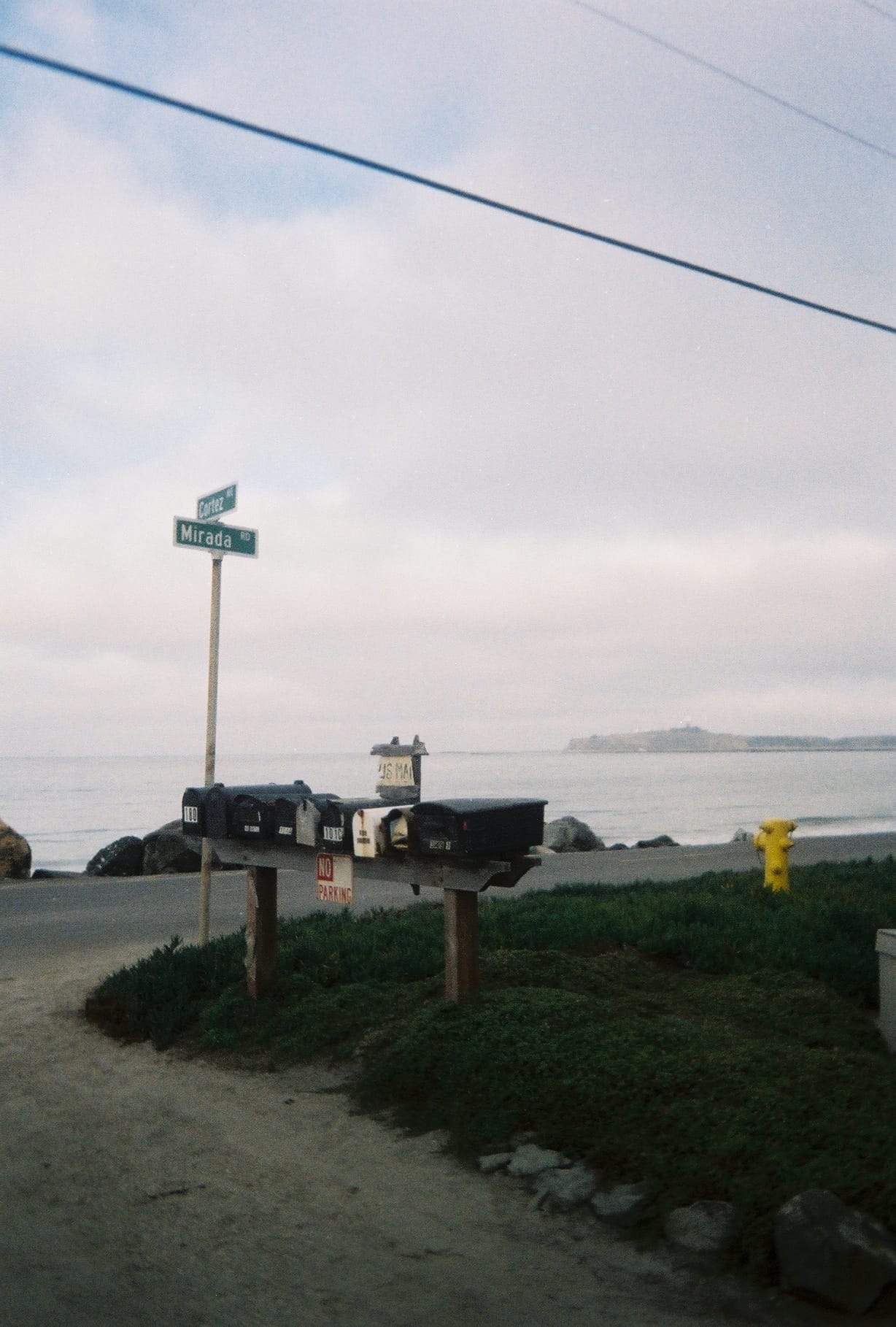
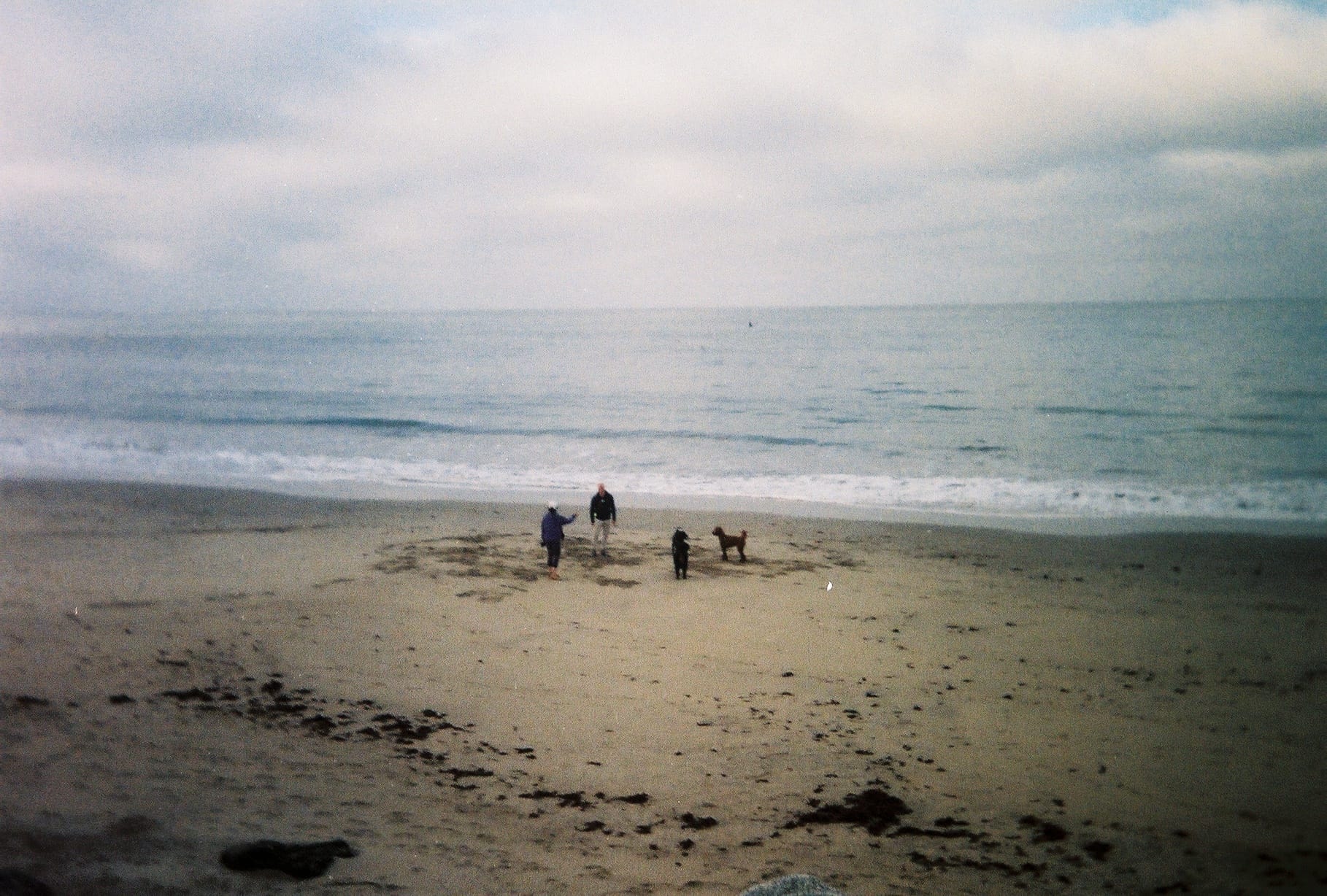
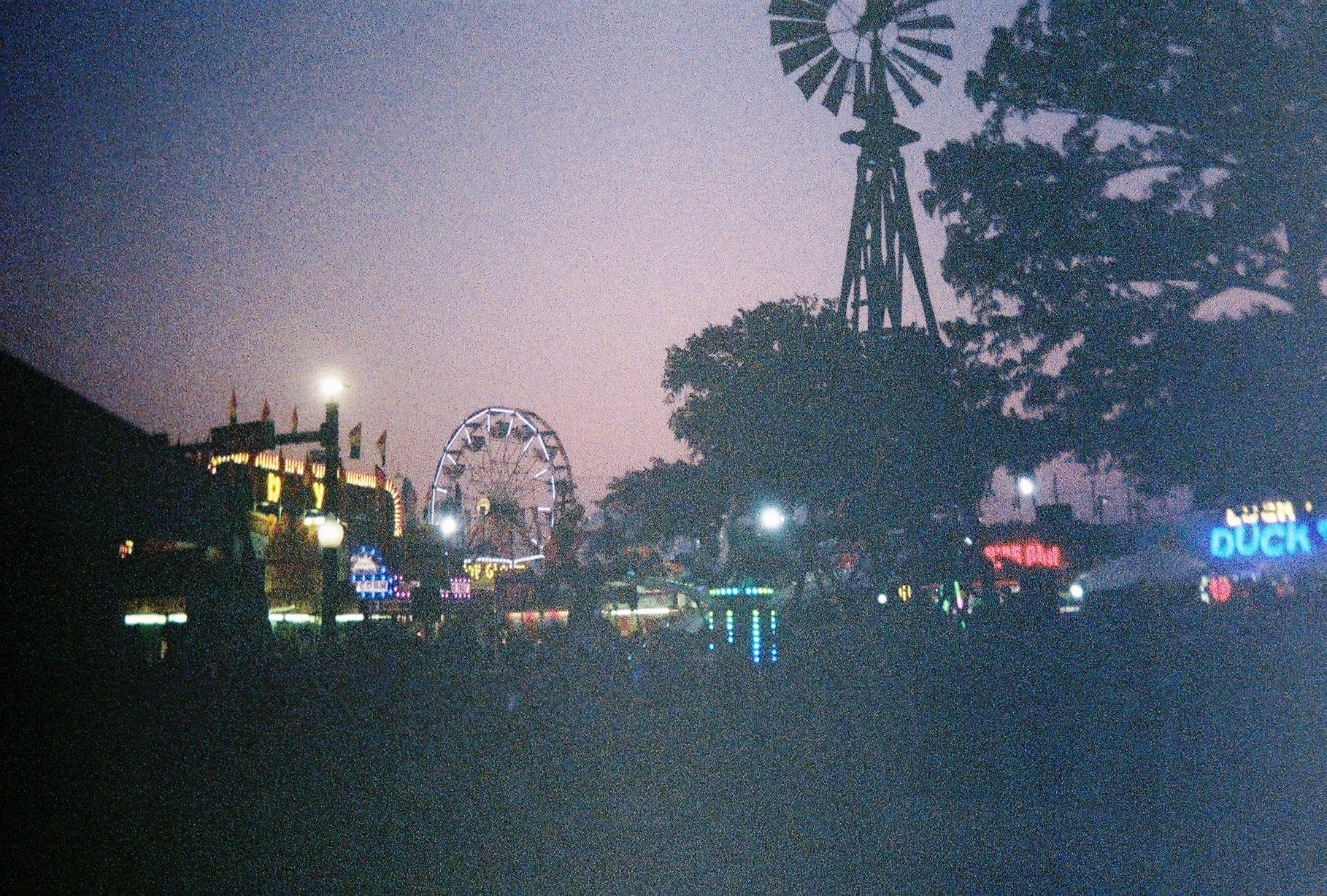

Film from my travels in fall of this year
Speaking of Latinx folk in STEM fields, I was also awarded the Latinos in Tech scholarship by the Hispanic Foundation of Silicon Valley. I got to meet some really ambitious and hard-working people from all different fields of STEM. We were invited to the Foundation's annual ball, and we were put to work selling raffle tickets for the next year's scholarship funding. I was paired up with a single mom who had been collecting Associate's degrees (if my memory serves correctly; one in Anthropology, a couple others and currently another in Astrophysics) in the hope—no, eventuality—of becoming a nuclear engineer. I got to meet a bunch of other people from different backgrounds and it was truly inspiring to see that much excellence.
The last thing I want to talk about is my thesis for the Chicanx & Latinx Studies program. I'm currently advised by Professor Pablo Gonzalez, but to be absolutely clear: my thesis is a community project. In addition to the working group with Professor Gonzalez and the others doing their theses; I have had graduate students and PhDs help me with some of the technical research methodologies, and the communities that I'm researching with in my hometown of El Sereno are actively shaping my work. It's taken many iterations to get to where I am—and I'm not fully done, but my work is mostly centering around the role of social media and algorithms in community gathering and creation. I've been working with the Eastside Cafe in El Sereno (@eastsidecafela on Instagram) and the El Sereno Community Garden (@elserenocommunitygarden) on my research.
Something we believe in Ethnic Studies is that research should not be a one-way street. A lot of older sociological and anthropological research was very extractive—as evident by the keeping of Native people's remains. Research should instead be primarily for the communities and people that are the subjects. That, to me, inherently means you include them in the process. Further, the communities that I am getting to learn about are teaching me a lot and guiding my work. Some times it's very explicit, and I have had community members push my thinking and work. Other times, it's the insights that people give me. 'Oh, you should talk to so-and-so because they'll help bring some clarity.' These moments of collaboration are crucial to my research.
I currently write this in the midst of this work. I don't know yet what I've found or what all the stories I've heard mean. But, I will get there with the help of these communities.
Sayings like 'it takes a village' are maybe trite, but they nonetheless hold true. My year cannot be defined by just myself: there are countless people in these stories that have nurtured my growth and vice versa. If there is one takeaway from my year; it's that we need community in order to succeed. In being in others' presence, we are actively engaging in community building. When you give yourself to others, you build a world that is of your making through the lasting impact you have.
I have had a fantastic year by all measures. This didn't even make the cut, but during my recruiting season for my post-grad job, I got to choose between working as a Software Engineer at Databricks and Stripe. I ended up choosing Databricks, even though I really loved and will cherish my time at Stripe. The gravity of having this option isn't lost on me: I understand that this is a really great position to be at in this particular point in time.
This year for me has been one of community and work—often combined. I would not be where I am without the people that enabled my growth. Still, the work continues. I've got one more semester ahead of me before I can graduate, and I've got a lot of plans and goals.
If you're still reading, thanks for taking the time to hear some of my stories and thoughts. Given that social media is actively shortening our attention spans, I appreciate that you are still able to dedicate some time to entertaining the thoughts that comprised my year. I'm going to start publishing more of my curiosities on this blog. The plan is to start aiming towards creating better futures and modes of being. We'll see if I can actually do that.
For now, with love, Alexander.
